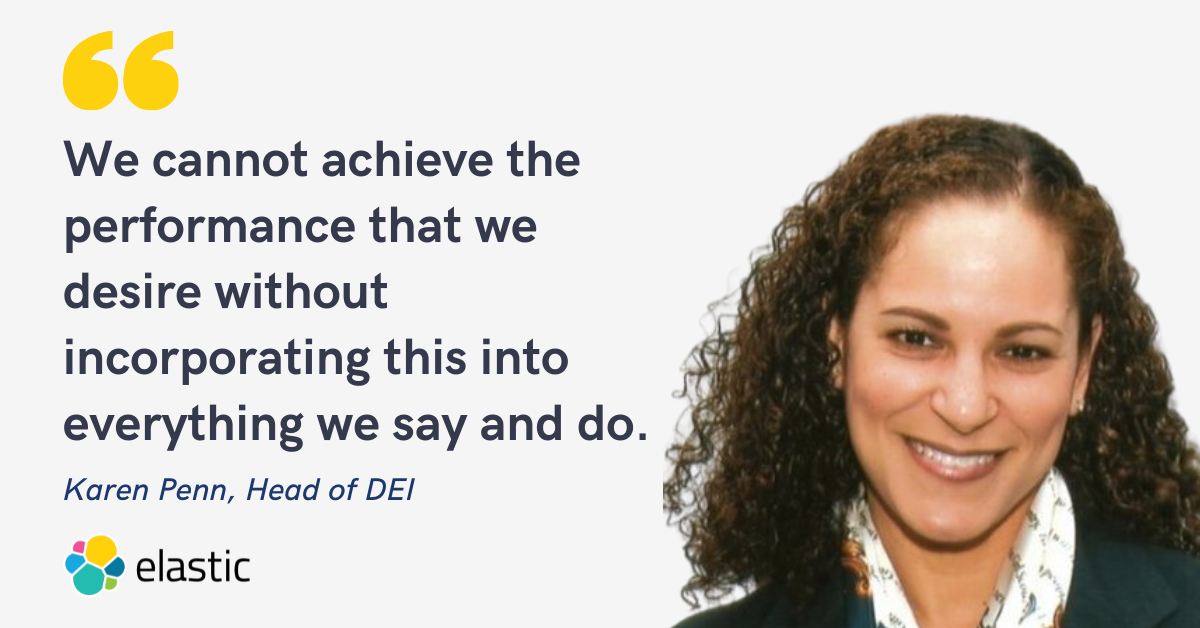Karen Penn credits her career evolution with her lack of patience.
The former government lawyer found herself appreciative of the chance to shape DEI policy at a Department of Defense component agency. But it was slow going.
“My analogy is trying to turn an aircraft carrier around on a lake. Or now I can say, trying to get the container ship that got stuck in the Suez canal out,” she says, smiling. “It’s hard for me to wait years and years to see change. Particularly when, in the tech industry, there’s opportunity with the right leadership support to make meaningful, quick changes that set the framework for longer-term impact.”
Now, as the Head of DEI at Elastic, a distributed company that powers search solutions, Karen is able to make lasting changes supported by an internal culture of openness, growth, and a commitment to inclusion. With employees in 40 countries and with 100-plus different nationalities, building a DEI approach that scales globally has been an exciting challenge.
We sat down with Karen to hear more about her career path and about how she’s helping to support and evolve organic DEI efforts to serve Elasticians around the world.
A “Recovering Lawyer”
Like many kids, Karen used to love sitting around the dinner table and listening to her dad’s stories from work. Especially since her dad was a judge.
“I was so enthralled by not only his lived experiences as a Black man, but from what he saw happening in the courtroom every day,” she says. “I wanted to be a lawyer because I wanted to be just like my dad.”
That passion took Karen to law school, where she enjoyed honing her skills in logical analysis, but realized she didn’t want to be taking cases to court as a criminal or corporate lawyer. So after serving as a judicial law clerk, she took a job working for the Office of Civil Rights within the U.S. Department of Justice, where she was responsible for ensuring that grant recipients had equal opportunity plans in place and weren’t being discriminatory.
“That really opened my perspective to what happens to folks who face inequality,” she reflects.
After 4 years, she was ready for something with a faster pace. She applied for an in-house role that grew into becoming the Head of HR for a small company.
“I quickly realized that this thing called HR is what I was supposed to be doing,” she says. “HR is really the cultural heartbeat of an organization, where you’re able to create and implement policy and processes that have influence.”
Volunteering during the 2008 election inspired Karen to get back into government work, though, so that’s when she joined the Department of Defense to stand up their DEI recruitment function in the Defense Contract Management Agency.
When her bureaucracy meter had tapped out again, she started working as an HR consultant, embedding in companies that needed short-term help. Her last placement was with Endgame, a cybersecurity firm acquired by Elastic two years ago.
Because of Elastic’s fast-paced growth, says Karen, there was a need for HR talent that understood the tech space and how to support an inclusive culture in a distributed company. She stepped up and joined the company’s senior HR leadership team, where she currently runs the company’s DEI efforts and their CSR program, Elastic Cares.
“My experiences growing up as a Black woman, hearing stories about inequality and discrimination and experiencing my own, learning about it in undergrad and law school studies, and seeing it at the justice department, it fueled everything I do,” says Karen of her path. “It’s all about equality.”
Solidifying Organic Efforts
Shortly after Karen became part of the Elastic team, George Floyd’s murder sent shockwaves across the U.S. and also across the globe.
At that point in time, Karen describes Elastic’s DEI efforts as “good folks being good, but no cohesive approach.” Organic communities had formed on Slack, bringing together Black employees, LGBTQIA+ employees, and women who worked at Elastic to talk about their shared experiences.
Karen’s first step was to reshape the conversation around DEI as a company. She launched a newsletter that explored the nuance of representation at work, leaning on her lawyer background to explain the difference between quotas (illegal!) and good-faith hiring targets, for instance.
She also helped expand Elastic Cares, Elastic’s approach to CSR, to include direct links to DEI efforts. For example, Elastic Cares hosts quarterly sessions featuring nonprofits (NPOs), sourced in collaboration with 7 employee resource groups (ERGs), that have explored intersectional anti-discrimination, underrepresentation in tech, among others. Employees are encouraged to use 40 hours of volunteer time off to support NPOs of their choosing (Karen herself works with a nonprofit that helps resettle refugees); they are also encouraged to utilize a $1,500 (or the equivalent in local currency) gift matching budget to causes they care about, and/or nominate charities for free Elastic cloud clusters through the NPO Granting Program.“Rolling Elastic Cares under the broader DEI effort gave us a vehicle for when folks say, ‘What can I do to help be part of the solution?’” says Karen.
A Global, Distributed Approach to DEI
The Elastic community responded well to Karen’s early DEI efforts. But Karen realized that what resonated with the U.S. team might not translate perfectly to employees in other countries.
“When you have a global organization, it’s really important that you’re not talking only about representation of African Americans, because that’s not going to translate to someone in Poland or Israel,” she says.
To help with that, Karen has focused on a broad definition of what diversity means. “It’s cognitive, it’s language, it’s learning style; it’s limitless,” she says.
As Elastic’s DEI efforts scale globally, Karen leans on the company’s Source Code, or a set of shared ideas that all employees are building towards. Part of the Source Code reads as follows:
Our products are distributed by design, our company is distributed by intention. With many languages, perspectives, and cultures, it’s easy to lose something in translation. Over email and chat, doubly so. Until we get a perpetual empathy machine, don’t assume malice.
A distributed Elastic makes for a diverse Elastic, which makes for a better Elastic.
That idea, says Karen, is manifested in a new practice called “Respect the Pause, and Pause and Explain.” It describes an approach to dealing with awkward interactions around the topic of DEI that can be partially attributed to cultural differences, and gives employees a procedure for exploring those topics while still assuming positive intent.
Karen is also leveraging ERGs to better support employees around the globe, including efforts to offer more expansive options for self-identification and ensuring that every ERG has cross-regional representation and diverse executive sponsorship.
Commitment to Evolution
Elastic hosts an annual global conference called Elasticon. At the last two events, Karen was pleased to see managers around the globe talking about managing within a DEI framework, unprompted.
“Before it was always HR talking about it, and now I’ve seen more leadership and senior management incorporating this into their day-to-day,” she says. “Employees are asking more, and the asks are more complex and they’re more frequent, which is great.”
Karen and her HR peers know that Elastic isn’t done addressing DEI—they’re just getting started.
But she’s excited to keep building.
“We’ve got a long way to go. We have some managers who are already doing this, and others that aren’t yet, that say, ‘Oh, I don’t have time for that,’” she says. “But it’s our position that you have to make time, because we cannot achieve the performance that we desire without incorporating this into everything we say and do.”




